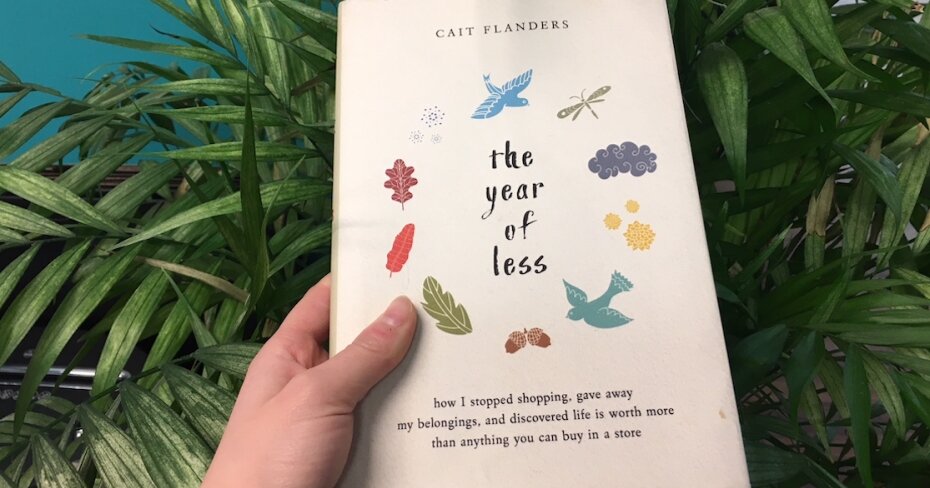‘The Year of Less’ is a book that resonates in an age of indulgence
By: Nicole Ballantyne-Choo on February 27, 2018
When I heard about Cait Flanders’ new book, The Year of Less, I thought it was going to be a book about the difficulties a young woman faced by not shopping for a year.
Boy, was I wrong.
The memoir is so much more. It’s incredibly relatable, and Flander’s honesty about her addictions — whether it was shopping, alcohol, food or Netflix — really captivated me every step of the way. More importantly, it left me inspired to make some serious changes in my own life.
I’ve always been someone who likes everything to go exactly as I plan. When it doesn’t, I’m hard on myself. Because I set high (sometimes irrational) expectations, I often spend a ridiculous amount of time overthinking when things go wrong. Having the mindset where I constantly feel like I’m not doing enough, or just not good enough, leaves me always looking for ways to improve myself.
This mindset has gotten me to the point where my room has become filled with a random collection of stuff — books, clothes, makeup, planners — that I’ll justify buying and keeping with the mantra, “this will make me a better version of myself.”
However, the person that I am and the person that I think I should be aren’t aligned and are always changing, making this so called collection of stuff really just a big mess.
Arriving at this point is something so many of us can relate to, and Flanders lays out a path for us to climb out and emerge happier.
“The math was simple. I had dug myself into a hole too deep, and had no choice but to start clawing my way out if it,” Flanders says early on in The Year of Less.
The math was simple. I had dug myself into a hole too deep, and had no choice but to start clawing my way out if it
The challenge Flanders set out for her own self, and the main focus of The Year of Less, is to not shop for an entire year (excluding groceries, cosmetics and toiletries when she ran out, gas for her car, gifts for others, cleaning products, and things she approved herself to buy such as a dress she can wear to multiple weddings and anything that has to be replaced as long she got rid of the original) — which (to me at least) sounds hard.
She breaks down the chapters of her book month-by-month to share her progress with her readers. At the beginning of each chapter, she documents how many months sober she is, the percentage of her income that she saved, the percentage of her belongings tossed. Some months, she included an additional percentage: how confident she was in her project, whether she felt she could make it to the end of the year. I like that this number fluctuated throughout the book. It was an honest representation of her growth and struggles as the year progressed.
Her decision to do a shopping ban didn’t happen overnight, and Flanders struggled and overcame other addictions that prepared her for her journey ahead — she knew it wasn’t going to be easy. But as the months went on, she felt more confident in herself and actually extended the ban for an extra year.
(Since I don’t want to reveal any spoilers in this piece, I won’t disclose the heartbreaking ways they came to be, how she overcame her struggles when she relapsed, and the ways she ultimately motivated herself to defeat them.)
As I continued reading, I found myself having a lot in common with Flanders. When she used to drink, she felt it made her a cooler version of herself. I remember having the same thought when I wanted to mask my shy and awkward personality when first meeting people. Flanders also shared how when she went through a terrible breakup, she would numb her pain with food and drinks, and this too hit close to home. I remembered going through a tough breakup when I was 22 and how I would try to meet up with as many friends for drinks or junk food and movie nights so that I wouldn’t have to think about being sad.
There were really only two categories I could see: the stuff I used, and the stuff I wanted the ideal version of myself to use
And so we get to the shopping ban. Flanders decided she had to do this because as someone who is normally neat and organized, she couldn’t find things she needed when she needed them. She could only find things she never wore or used. This really struck a chord with me because I’ve realized that I’m either always late for social time with my friends or I take longer than I should to get ready because I can never find what I’m looking for. This book was the wake up call that I have to start making changes.
“There were really only two categories I could see: the stuff I used, and the stuff I wanted the ideal version of myself to use,” Flanders writes.
She ended up getting rid of 70% of her belongings. When it came to her clothes, Flanders decided to get rid of the clothes that didn’t fit her anymore and clothes she only wore when she worked in a government job. She also noticed she had a lot of clothes that she bought only because she thought successful women wore those types of outfits so she should, too. As someone who has always bought a new wardrobe when starting a new job, I’ve come to realize this is a bad habit — clothes won’t make me appear more put together. My personality and work ethic will.
I found myself rooting for Flanders as I read the book. When she slipped up and ordered an e-reader because a Black Friday sale arrived in her inbox, I wanted to tell her it was OK. When her parents got divorced and she suffered from depression where she wouldn’t leave her bed and would keep Netflix on just so she could hear people talking, I wanted to tell her things would get better.
After reading The Year of Less, I’ve decided that while I might not be ready to challenge myself to a shopping ban, I am ready to take baby steps and spend an entire day or weekend to go through my closet and donate everything I don’t actually need. I’m also ready to be more mindful of my spending by using Flanders’ tactic of tracking the percentage of money I save each month. Similar to the shopping ban but not as intense, I’ve also decided to put a ban on ordering from food delivery services. These services cost me a lot of money — especially when I’ve already bought groceries but am too lazy to cook.
Ultimately, it left me with a takeaway I feel we could all use in our life: “more was never the answer
I feel I read The Year of Less at the perfect time in my life. I’ve been thinking of ways to change my mindset and lifestyle to be more positive and less materialistic, but didn’t know where to start — until I picked up this memoir. This is the perfect companion book to read when you’re figuring out your life. Whether you’re trying to sort out your career, decide which friendships are worth holding onto, or change habits (this could be eating, exercising, meditating, spending), readers will find it easy to relate to the struggles and lessons The Year of Less has to offer.
Ultimately, it left me with a takeaway I feel we could all use in our life: “more was never the answer,” Flanders writes.
“The answer, as it turned out, was always less.”


